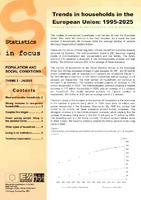Statistics in Focus: Population and social conditions. Trends in households in the European Union: 1995-2025.
| dc.contributor.author | Eurostat |
| dc.date.accessioned | 2020-09-28T05:52:58Z |
| dc.date.available | 2020-09-28T05:52:58Z |
| dc.date.issued | 2003 |
| dc.identifier.issn | 1024-4352 |
| dc.identifier.uri | https://ketlib.lib.unipi.gr/xmlui/handle/ket/2856 |
| dc.description | 2003.24 |
| dc.description | http://aei.pitt.edu/id/eprint/85489 |
| dc.description.abstract | The number of one-person households is on the rise all over the European Union. This trend will continue in the next decades. As a result the total number of households will increase, while the average number of persons sharing a household will decline further. These are the results of three long-term national household scenarios recently compiled by Eurostat. The individualisation scenario (IS) assumes ongoing trends of individualisation and secularisation and low fertility. The family scenario (FS) assumes a slowdown in the individualisation process and high fertility. The baseline scenario (BS) is the average of these scenarios. |
| dc.format.extent | 8p. |
| dc.language.iso | en |
| dc.publisher | Statistical Office of the European Communities and Social Statistics |
| dc.subject | Family social security |
| dc.subject | Household expenditure |
| dc.subject | Family Budgets |
| dc.title | Statistics in Focus: Population and social conditions. Trends in households in the European Union: 1995-2025. |
| dc.type | working document |
| dc.publisher.place | Luxembourg |

